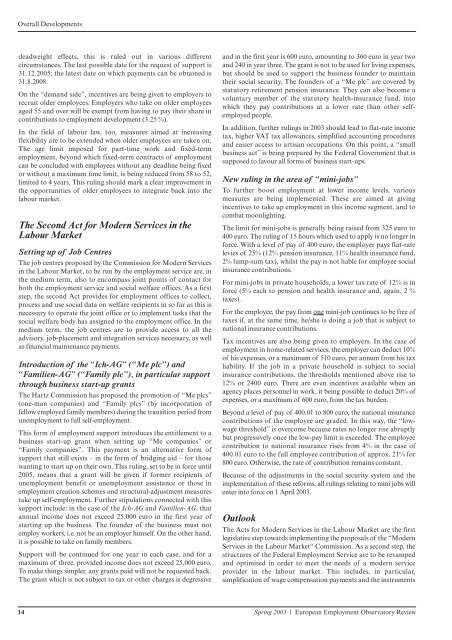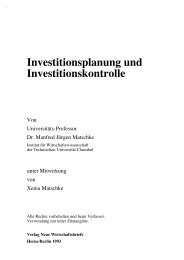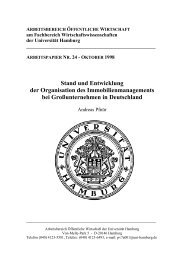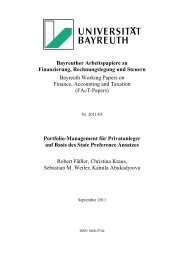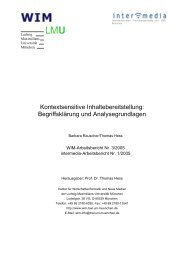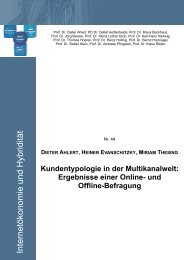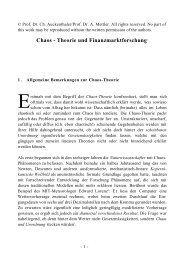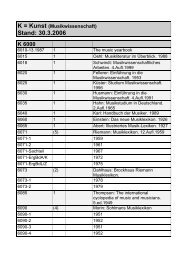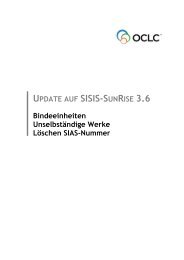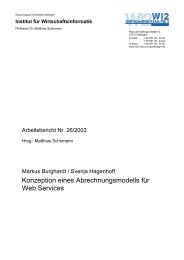FRANCE The
FRANCE The
FRANCE The
You also want an ePaper? Increase the reach of your titles
YUMPU automatically turns print PDFs into web optimized ePapers that Google loves.
Overall Developments<br />
deadweight effects, this is ruled out in various different<br />
circumstances. <strong>The</strong> last possible date for the request of support is<br />
31.12.2005; the latest date on which payments can be obtained is<br />
31.8.2008.<br />
On the “demand side”, incentives are being given to employers to<br />
recruit older employees. Employers who take on older employees<br />
aged 55 and over will be exempt from having to pay their share in<br />
contributions to employment development (3.25 %).<br />
In the field of labour law, too, measures aimed at increasing<br />
flexibility are to be extended when older employees are taken on.<br />
<strong>The</strong> age limit imposed for part-time work and fixed-term<br />
employment, beyond which fixed-term contracts of employment<br />
can be concluded with employees without any deadline being fixed<br />
or without a maximum time limit, is being reduced from 58 to 52,<br />
limited to 4 years. This ruling should mark a clear improvement in<br />
the opportunities of older employees to integrate back into the<br />
labour market.<br />
<strong>The</strong> Second Act for Modern Services in the<br />
Labour Market<br />
Setting up of Job Centres<br />
<strong>The</strong> job centres proposed by the Commission for Modern Services<br />
in the Labour Market, to be run by the employment service are, in<br />
the medium term, also to encompass joint points of contact for<br />
both the employment service and social welfare offices. As a first<br />
step, the second Act provides for employment offices to collect,<br />
process and use social data on welfare recipients in so far as this is<br />
necessary to operate the joint office or to implement tasks that the<br />
social welfare body has assigned to the employment office. In the<br />
medium term, the job centres are to provide access to all the<br />
advisory, job-placement and integration services necessary, as well<br />
as financial maintenance payments.<br />
Introduction of the “Ich-AG” (“Me plc”) and<br />
“Familien-AG” (“Family plc”), in particular support<br />
through business start-up grants<br />
<strong>The</strong> Hartz Commission has proposed the promotion of “Me plcs”<br />
(one-man companies) and “Family plcs” (by incorporation of<br />
fellow employed family members) during the transition period from<br />
unemployment to full self-employment.<br />
This form of employment support introduces the entitlement to a<br />
business start-up grant when setting up “Me companies” or<br />
“Family companies”. This payment is an alternative form of<br />
support that still exists – in the form of bridging aid – for those<br />
wanting to start up on their own. This ruling, set to be in force until<br />
2005, means that a grant will be given if former recipients of<br />
unemployment benefit or unemployment assistance or those in<br />
employment creation schemes and structural-adjustment measures<br />
take up self-employment. Further stipulations connected with this<br />
support include: in the case of the Ich-AG and Familien-AG, that<br />
annual income does not exceed 25,000 euro in the first year of<br />
starting up the business. <strong>The</strong> founder of the business must not<br />
employ workers, i.e. not be an employer himself. On the other hand,<br />
it is possible to take on family members.<br />
Support will be continued for one year in each case, and for a<br />
maximum of three, provided income does not exceed 25,000 euro.<br />
To make things simpler, any grants paid will not be requested back.<br />
<strong>The</strong> grant which is not subject to tax or other charges is degressive<br />
and in the first year is 600 euro, amounting to 360 euro in year two<br />
and 240 in year three. <strong>The</strong> grant is not to be used for living expenses,<br />
but should be used to support the business founder to maintain<br />
their social security. <strong>The</strong> founders of a “Me plc” are covered by<br />
statutory retirement pension insurance. <strong>The</strong>y can also become a<br />
voluntary member of the statutory health-insurance fund, into<br />
which they pay contributions at a lower rate than other selfemployed<br />
people.<br />
In addition, further rulings in 2003 should lead to flat-rate income<br />
tax, higher VAT tax allowances, simplified accounting procedures<br />
and easier access to artisan occupations. On this point, a “small<br />
business act” is being prepared by the Federal Government that is<br />
supposed to favour all forms of business start-ups.<br />
New ruling in the area of “mini-jobs”<br />
To further boost employment at lower income levels, various<br />
measures are being implemented. <strong>The</strong>se are aimed at giving<br />
incentives to take up employment in this income segment, and to<br />
combat moonlighting.<br />
<strong>The</strong> limit for mini-jobs is generally being raised from 325 euro to<br />
400 euro. <strong>The</strong> ruling of 15 hours which used to apply is no longer in<br />
force. With a level of pay of 400 euro, the employer pays flat-rate<br />
levies of 25% (12% pension insurance, 11% health insurance fund,<br />
2% lump-sum tax), whilst the pay is not liable for employee social<br />
insurance contributions.<br />
For mini-jobs in private households, a lower tax rate of 12% is in<br />
force (5% each to pension and health insurance and, again, 2 %<br />
taxes).<br />
For the employee, the pay from one mini-job continues to be free of<br />
taxes if, at the same time, he/she is doing a job that is subject to<br />
national insurance contributions.<br />
Tax incentives are also being given to employers. In the case of<br />
employment in home-related services, the employer can deduct 10%<br />
of his expenses, or a maximum of 510 euro, per annum from his tax<br />
liability. If the job in a private household is subject to social<br />
insurance contributions, the thresholds mentioned above rise to<br />
12% or 2400 euro. <strong>The</strong>re are even incentives available when an<br />
agency places personnel in work, it being possible to deduct 20% of<br />
expenses, or a maximum of 600 euro, from the tax burden.<br />
Beyond a level of pay of 400.01 to 800 euro, the national insurance<br />
contributions of the employee are graded. In this way, the “lowwage<br />
threshold” is overcome because rates no longer rise abruptly<br />
but progressively once the low-pay limit is exceeded. <strong>The</strong> employee<br />
contribution to national insurance rises from 4% in the case of<br />
400.01 euro to the full employee contribution of approx. 21% for<br />
800 euro. Otherwise, the rate of contribution remains constant.<br />
Because of the adjustments in the social security system and the<br />
implementation of these reforms, all rulings relating to mini jobs will<br />
enter into force on 1 April 2003.<br />
Outlook<br />
<strong>The</strong> Acts for Modern Services in the Labour Market are the first<br />
legislative step towards implementing the proposals of the “Modern<br />
Services in the Labour Market“ Commission. As a second step, the<br />
structures of the Federal Employment Service are to be revamped<br />
and optimised in order to meet the needs of a modern service<br />
provider in the labour market. This includes, in particular,<br />
simplification of wage compensation payments and the instruments<br />
14 Spring 2003 | European Employment Observatory Review


